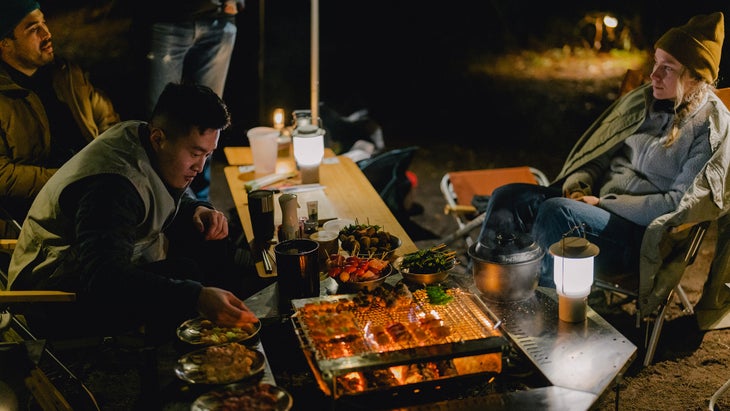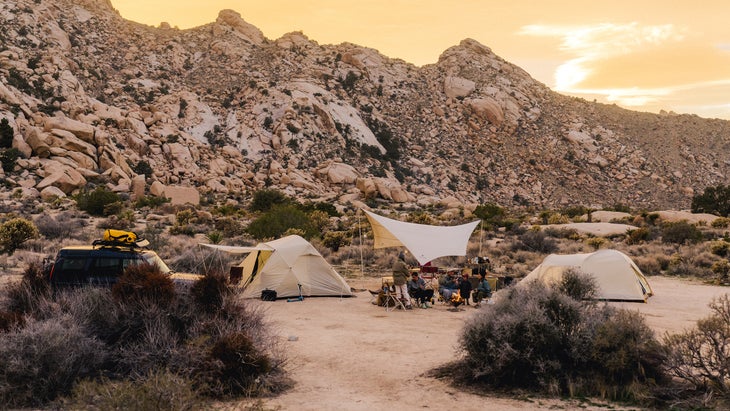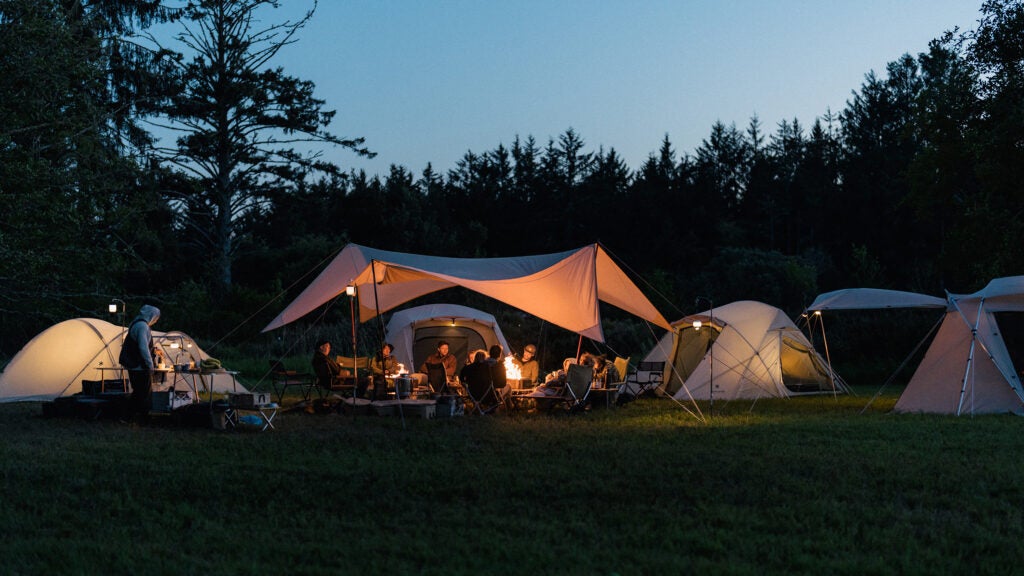No products in the cart.
Outdoor Adventure
This Japanese Gear from Snow Peak Can Reduce Camping Stress
I love camping with my family, but if I’m being totally honest, it stresses me out. I used to think the stress came from a lack of planning, too much gear, or just generalized anxiety, but have begun to realize it has much more to do with my—and many Americans’—approach to being outside.
These thoughts were refined during a recent Zoom call with Yui Uchida, chief brand officer for the Japanese outdoor gear company Snow Peak, who explained that most Japanese campers have developed a much simpler relationship with the outdoors.
“Most basically, we’ve realized that the Japanese view of nature is quite different from many other modern views,” Uchida told me. “For us, nature is something we want to be harmonious with and in existence with, and for many other people nature is instead something that needs to be conquered or challenged. This is fundamental to how we then choose to spend our time outside.”
Uchida said that for many people in the United States, the top activities for campers often include hiking, fishing, mountain biking, trail running, or other sports where there’s a place to go and an objective to complete—I include myself in this group. For many of Snow Peak’s Japanese customers, however, the top activities are things like cooking, star gazing, and forest bathing, which is just sitting in the forest and taking in the sounds, sights, and smells.
Uchida’s perspective immediately appealed to me, and I have vowed to do things differently this camping season. I want to slow down and appreciate simply being outside. Maybe it’s age (I’m currently 43), or just being fed up with what camping has become, but I’ve turned a page and want to redefine what camping means.
Snow Peak has long preached a more meditative approach to sleeping under the stars—it’s not some marketing gimmick they recently dreamt up. Managed for years by Tohru Yamai, a Japanese businessman who felt overwhelmed by the pace of modern life even back in the 1980s, the brand has always promoted camping as a slow pursuit and, in turn, designs a wide variety of gear to create maximum relaxation.

When you buy through our links, we may earn an affiliate commission. This supports our mission to get more people active and outside. Learn more.
Their most well-known product that represents this approach is the Takibi Grill. Made from stainless steel, it’s a packable charcoal grill that’s purposely designed to be the opposite of the classic Coleman. Instead of firing up immediately like a propane burner, the Takibi takes time to get ready, and then grilling takes some attention. In other words, the grill is not just there to make food, but instead creates an experience.
“Cooking on the Takibi often becomes one of the most memorable experiences of any trip because you can create restaurant quality meals, and because it forces us to enjoy the experience of cooking,” says Michael Andersen, the senior brand manager of Snow Peak USA.
Michael’s quote reminded me of a passage in Four Thousand Weeks the best-selling book by Oliver Burkeman that talks about how many Westerners have come to fixate on time and productivity. Many people, he points out, are unable to fix anything, like a household appliance, because they have no patience and cannot enjoy the process of figuring things out.
For me, camp cooking is like fixing a leaky faucet, in that I see both only as a problem to be solved and want to get through the process as quickly as possible. But quick and good don’t seem to coexist in either circumstance. So instead of racing to finish dinner on my two-burner grill, the idea of firing up charcoal and then spending the time to get a perfectly cooked hamburger this summer seems like the fix I need.

Another example of Snow Peak’s different approach comes in its broad lineup of tarps. For us Westerners, tarps are either places to hide from the rain, or they’ve become popular as lightweight sleeping shelters for people who want to move fast and light. But for Snow Peak they mean something entirely different.
Their tarps are places where people cook, relax, and take in their surroundings. As a result, the tarps are designed with high roofs and broad footprints that promote gathering and enjoying each other’s company.
“In Japan people spend a lot of time in smaller spaces, so we know how to maximize these smaller spaces, like a tarp, through shape and design,” Uchida said.
Unlike the tarps we’re used to seeing here in the States, which are either used as flat roofs or maybe in an A-frame, all the Snow Peak tarps have a unique geometric shape, which Uchida said is very much a deliberate design.
“From outside, the tents and tarps are meant to harmoniously blend with the environment,” he said. “All the lines are there for protection but are also meant to look like an extension of the surrounding natural elements.”
This intentionality of design extends to other Snow Peak products. For me, a camp tent is just a place to sleep or hide from the elements, but all of Snow Peak’s tents are designed for lounging, hanging out, and moving slowly. Many have big vestibules where you can relax in a chair, and most have big enough footprints that you can insert cots and tables inside to create an eating space, or quiet spot to take in your morning coffee.
Noah Reis, the chief operating officer of Snow Peak USA, brought it all together when he told me that for a long time now Snow Peak has watched as the world pushes father and father toward efficiency. The brand has no problem with people who love ultralight backpacking, but that’s not the game they’re playing. They know the power of being outside and will always create gear in their own unique way.
“As the world gets faster and faster, we’re losing a sense of belonging,” Ries said. “But we know that the outdoors and camping will always be the perfect antidote that brings us back together.”
Source link

